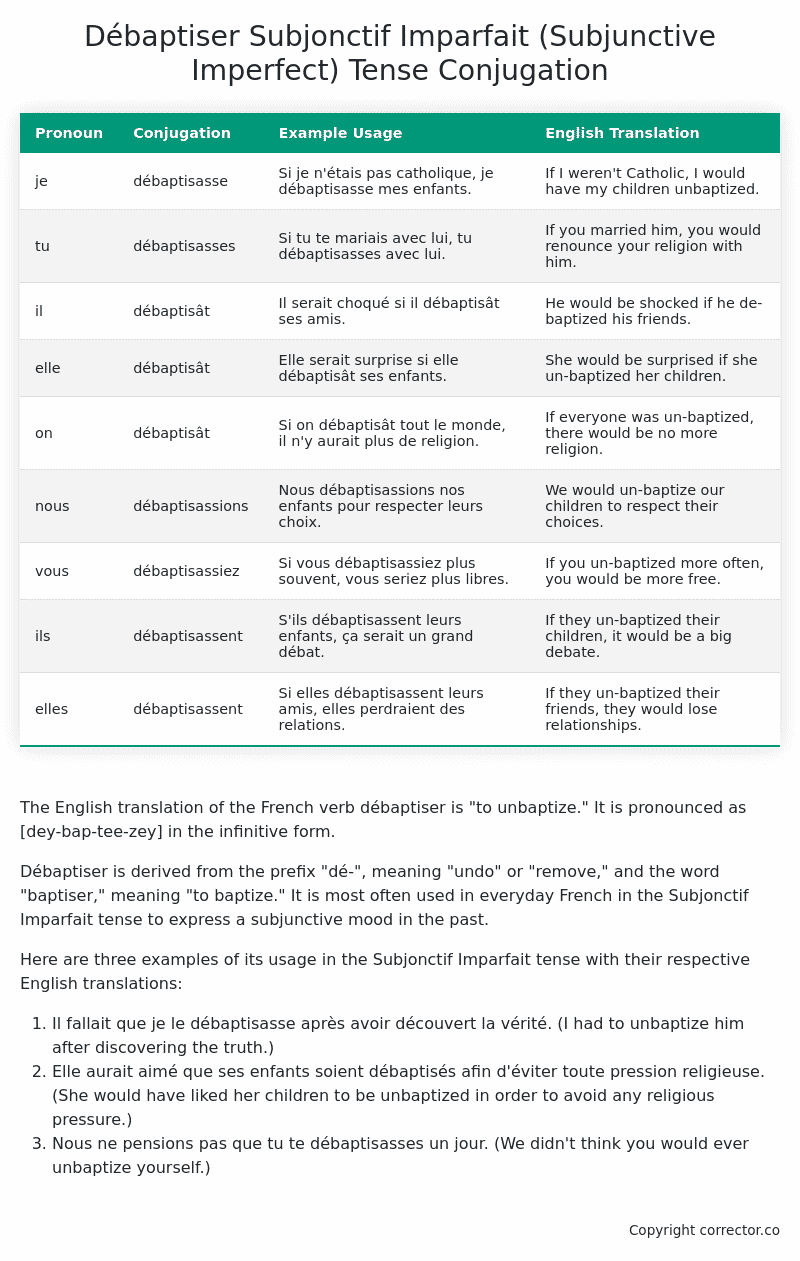Subjonctif Imparfait (Subjunctive Imperfect) Tense Conjugation of the French Verb débaptiser
Introduction to the verb débaptiser
The English translation of the French verb débaptiser is “to unbaptize.” It is pronounced as [dey-bap-tee-zey] in the infinitive form.
Débaptiser is derived from the prefix “dé-“, meaning “undo” or “remove,” and the word “baptiser,” meaning “to baptize.” It is most often used in everyday French in the Subjonctif Imparfait tense to express a subjunctive mood in the past.
Here are three examples of its usage in the Subjonctif Imparfait tense with their respective English translations:
- Il fallait que je le débaptisasse après avoir découvert la vérité. (I had to unbaptize him after discovering the truth.)
- Elle aurait aimé que ses enfants soient débaptisés afin d’éviter toute pression religieuse. (She would have liked her children to be unbaptized in order to avoid any religious pressure.)
- Nous ne pensions pas que tu te débaptisasses un jour. (We didn’t think you would ever unbaptize yourself.)
Table of the Subjonctif Imparfait (Subjunctive Imperfect) Tense Conjugation of débaptiser
| Pronoun | Conjugation | Example Usage | English Translation |
|---|---|---|---|
| je | débaptisasse | Si je n’étais pas catholique, je débaptisasse mes enfants. | If I weren’t Catholic, I would have my children unbaptized. |
| tu | débaptisasses | Si tu te mariais avec lui, tu débaptisasses avec lui. | If you married him, you would renounce your religion with him. |
| il | débaptisât | Il serait choqué si il débaptisât ses amis. | He would be shocked if he de-baptized his friends. |
| elle | débaptisât | Elle serait surprise si elle débaptisât ses enfants. | She would be surprised if she un-baptized her children. |
| on | débaptisât | Si on débaptisât tout le monde, il n’y aurait plus de religion. | If everyone was un-baptized, there would be no more religion. |
| nous | débaptisassions | Nous débaptisassions nos enfants pour respecter leurs choix. | We would un-baptize our children to respect their choices. |
| vous | débaptisassiez | Si vous débaptisassiez plus souvent, vous seriez plus libres. | If you un-baptized more often, you would be more free. |
| ils | débaptisassent | S’ils débaptisassent leurs enfants, ça serait un grand débat. | If they un-baptized their children, it would be a big debate. |
| elles | débaptisassent | Si elles débaptisassent leurs amis, elles perdraient des relations. | If they un-baptized their friends, they would lose relationships. |
Other Conjugations for Débaptiser.
Le Present (Present Tense) Conjugation of the French Verb débaptiser
Imparfait (Imperfect) Tense Conjugation of the French Verb débaptiser
Passé Simple (Simple Past) Tense Conjugation of the French Verb débaptiser
Passé Composé (Present Perfect) Tense Conjugation of the French Verb débaptiser
Futur Simple (Simple Future) Tense Conjugation of the French Verb débaptiser
Futur Proche (Near Future) Tense Conjugation of the French Verb débaptiser
Plus-que-parfait (Pluperfect) Tense Conjugation of the French Verb débaptiser
Passé Antérieur (Past Anterior) Tense Conjugation of the French Verb débaptiser
Futur Antérieur (Future Anterior) Tense Conjugation of the French Verb débaptiser
Subjonctif Présent (Subjunctive Present) Tense Conjugation of the French Verb débaptiser
Subjonctif Passé (Subjunctive Past) Tense Conjugation of the French Verb débaptiser
Subjonctif Imparfait (Subjunctive Imperfect) Tense Conjugation of the French Verb débaptiser (this article)
Subjonctif Plus-que-parfait (Subjunctive Pluperfect) Tense Conjugation of the French Verb débaptiser
Conditionnel Présent (Conditional Present) Tense Conjugation of the French Verb débaptiser
Conditionnel Passé (Conditional Past) Tense Conjugation of the French Verb débaptiser
L’impératif Présent (Imperative Present) Tense Conjugation of the French Verb débaptiser
L’infinitif Présent (Infinitive Present) Tense Conjugation of the French Verb débaptiser
Struggling with French verbs or the language in general? Why not use our free French Grammar Checker – no registration required!
Get a FREE Download Study Sheet of this Conjugation 🔥
Simply right click the image below, click “save image” and get your free reference for the débaptiser Subjonctif Imparfait tense conjugation!

Débaptiser – About the French Subjonctif Imparfait (Subjunctive Imperfect) Tense
Formation
Common Everyday Usage Patterns
Interactions with Other Tenses
Subjonctif Présent
Indicatif Passé Composé
Conditional
Conditional Perfect
Summary
I hope you enjoyed this article on the verb débaptiser. Still in a learning mood? Check out another TOTALLY random French verb conjugation!


